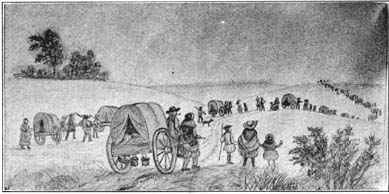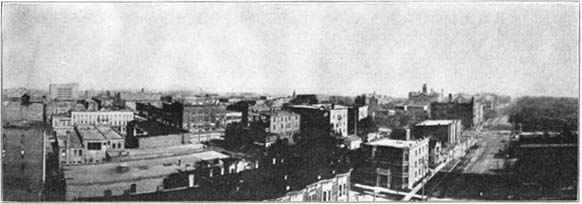|
108
|
SEMI-CENTENNIAL HISTORY OF
NEBRASKA
|
|
it to his own use. The governor's answer denied
the charges of boodling, but admitted the taking of the
$16,000, for which he claimed he had executed to the
state mortgages upon some three thousand acres of land
owned by him. The impeachment trial lasted through March,
April and May, ending June 4. By a vote of nine to three
the state senate found him guilty of unlawfully taking
the $16,000 and removed him from office,--he being
acquitted upon the other charges. Governor Butler had
many friends as well as enemies and the trial heated the
social atmosphere to a degree that has probably never
been exceeded since.
Pursuant to an act passed March 28, 1871, there met in
Lincoln in June, of that year, a convention of fifty-two
members, charged with the duty of framing a new state
constitution. The document was submitted to the people on
September 19, and defeated by a vote of 7,986 for, to
8,627 against. The principal objections to the
constitution were a clause which provided that church or
benevolent property above the value of $5,000 belonging
to any single association should be taxed; another clause
which provided that railroad right of way

Mormons Crossing the Plains to Salt Lake 1856
should be paid for without reference to any
supposed benefits the owner of the land might derive from
the construction of the road. Douglas county alone,--the
center of the religions and corporation influences,--gave
nearly nine hundred majority against the constitution.
The western counties generally returned large majorities
in its favor,--some of them twenty and thirty to one in
its favor.
Secretary of State James
became acting governor upon the impeachment of Governor
Butler. The impeachment trial had set everything on edge
and quarrels followed between James and the legislature.
The senate and house fell into a dispute on the subject
of adjournment and the acting governor declared them both
adjourned. In defiance of this the senate met and
transacted business, finally adjourning. A few days later
Governor James, having gone outside the state, Senator
Isaac S. Hascall, presiding officer of the senate, called
the legislature to meet in extra session. The governor
returned in haste and issued a proclamation vetoing the
extra session. Members of the legislature gathered at
Lincoln and joined in the controversy. Governor James
styled them the "rump" legislature. Anarchy
|






